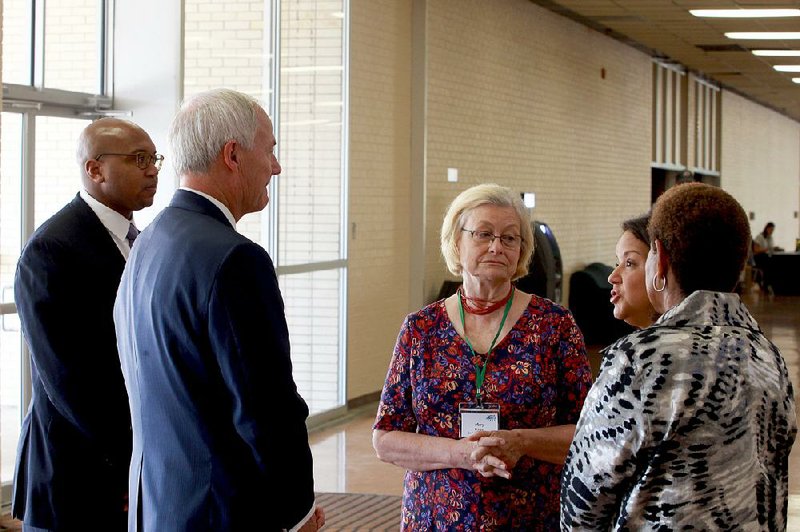PINE BLUFF -- Innovation and entrepreneurship are key to rural economic success, Gov. Asa Hutchinson said before a Pine Bluff economic meeting Wednesday.
Hutchinson was the keynote speaker at the Rural Rise Summit, a conference that brought together about 200 policymakers and entrepreneurs from 37 states to share techniques for rural areas seeking ways to jump-start their economies.
Addressing the economic hardships faced by much of the rural Delta, the governor said much of the debate over how to renew rural Arkansas centers on a question that he said is critical to everyone.
"How do we invigorate our rural communities and create more life there?" he asked.
Because historically the economy in Arkansas has centered on agriculture, rural communities have often suffered as innovations have advanced agricultural mechanization, costing thousands of jobs throughout the state over the past 100 years.
"That's not because of something we did wrong," he said. "That's something that life has changed for us and we have to adapt to it. There's less people that are demanded because of it."
Hutchinson said that as society has gotten more urbanized with younger people moving to the cities, opportunities have lagged behind in rural areas, a situation that he said requires that policymakers find strategies to adapt to the changes.
He said that agriculture still occupies the top spot in Arkansas industry, but that as innovations have improved efficiencies in agricultural production, those improved efficiencies are forcing rural areas to adapt to new ways of driving the economy for workers.
"You've got to work from your strengths in quality of life," Hutchinson said. "Not everyone wants to work in that urban environment. There are people who are attracted to the quality of life that you offer. That is your strength and you just have to build on it."
He gave an example of an artist from New York City who moved to Leslie, a town of about 400 people in Searcy County.
"They had an incredible clientele selling art," Hutchinson said. "They moved to Leslie, out in the country they have 5 acres, and they continue their art."
He listed several towns in the Delta region that have attracted new industry, such as Helena-West Helena, where EnviroTech Chemical Services, a company that manufactures industrial cleaning solvents, relocated from California. In Nashville, Hutchinson said, a Husqvarna plant employs 983 people, and in Stuttgart, 1,400 people are employed at Lennox International.
"These are communities that have industry, that have growth, right here in the heart of the agricultural base of Arkansas," Hutchinson said.
He said Pine Bluff has made great strides in economic development, too, as he pointed out the construction underway on the new library and the coming economic boost that Saracen Casino will provide.
"I love the excitement, of course, 1,100 jobs are going to be created with the new Saracen Casino Resort," Hutchinson said. "That was an initiative that was led by the Pine Bluff community in support of this initiative that will be creating jobs, investment and interest in this community."
The governor said education is the linchpin to economic growth, and he said career education is an important component, pointing out that not everyone intends to go to college. He said that when he took office in 2015, students at more than 55 high schools in the state did not have access to career learning centers.
"That has been reduced now to less than 10 and we're going to eliminate that so everyone has access to a career learning center," he said.
Ryan Whatley, the director of Go Forward Pine Bluff, gave the governor high marks for his comments.
"I was encouraged to know that we are headed down the right direction," Whatley said, "particularly with design of the Generator and what we've been talking about as far as providing skill sets to local citizens where they can participate in the global economy. We're very encouraged that we are in alignment with the state." The Generator is an innovation hub.
Whatley said, overall, the summit has provided a lot of interaction between participants, and a lot of networking opportunities between community leaders.
"A lot of them have been impressed with work that we're doing, that we're addressing everything with such a small crew," he said. "They've been able to appreciate what we're trying to do because they have the same challenges in their communities."
The Rural Rise Summit concludes today.
State Desk on 09/19/2019

